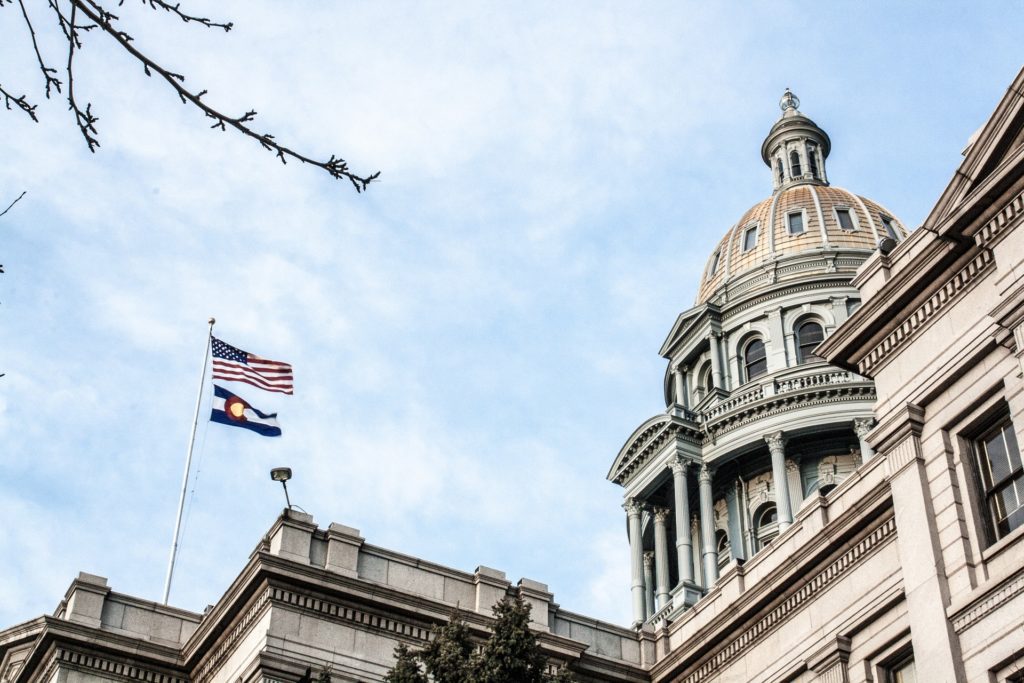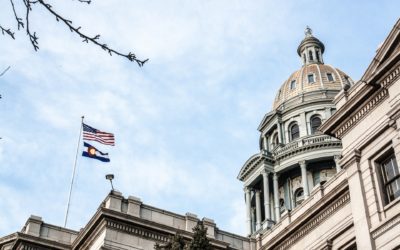
By Jeff Weist, Jefferson County Business Lobby
Colorado’s 2022 general election produced huge wins for Democrat Party candidates, extending and expanding their 4-year dominance of the State government. This election saw the largest number of competitive legislative seats in recent memory. Democrats won every single one. They will enter 2023 with larger, likely historic, majorities in both the State House and Senate, along with ongoing unified control of the Administrative Branch. It was a sobering night for the Republicans.
The fundamentals of this mid-presidential term election – the long pattern of mid-term gains by the out-of-power party, low presidential approval numbers, a looming recession, inflation, concerns over rising crime, etc. – raised Republican hopes for a wave year. The pundits agreed. Even the Democrats were worried. But most polls missed an equal or greater counter-wave that led the two parties to a draw at the national level and a Democratic blow out in Colorado.
The full reason for that counter-wave won’t be known for months when election exit polling is fully analyzed. Was it voters’ exhaustion with Republican election conspiracy theories? Or a reaction to the reversal of constitutional abortion protections? Or was it broad support for more progressive policies at the state level? Regardless of the reason, it is clear the politics of even the most local races have become nationalized and the Republican brand in Colorado has sunk to a new low in the mind of voters.
Both Republican and Democrat voter turnout was somewhat lower than in the last mid-term election in 2018. But unaffiliated voters, who now make up 45% of registered voters, turned in far more ballots in 2022 than in 2018. They determined the outcome in practically every competitive race and a majority backed Democrat candidates. The electorate in this election was also remarkably old – nearly 2/3rd of voters were over 45 years of age and were generally split among R, D and U. While (the notoriously hard to poll) younger voters turned out in smaller numbers, they overwhelmingly returned Democrat ballots.
In general, Colorado Democrats consistently outperformed both prior performance and the polling by 5-7 percentage points. Part of that can be credited to Democratic enthusiasm. It was depressed earlier in the year, but caught up and matched the already high Republican enthusiasm. National pollsters believe abortion and the return of Trump to the national headlines contributed significantly to that turnaround.
One last point. Unlike in other high-profile national races where Republican nominees suffered from weak campaigns, scandals and misteps, Colorado Republican primary voters generally chose wisely in competitive races, tapping more traditional Republican candidates over Trump-aligned ones. But even quality candidates and competitive financial resources could not overcome the voters’ dim view of Republicans generally.
Now, onto the high-level takeaways you need to know. You can see all the elections results for state candidates and ballot measures here.
Statewide Constitutional Offices
Democrats swept all four constitutional offices and both chambers of the Legislature (something not done since the Depression) in Trump’s own mid-term election in 2018. In 2022, Democrats retained all four offices, as was widely expected.
Governor Polis was reelected with an impressive 17% margin, reflecting his handling of COVID, a disciplined campaign and ability to avoid making any major unpopular mistakes over the last four years. His outsized margin was also helped by a Republican candidate who won her primary largely on the promise of being the traditional conservative candidate, but who then pivoted to the populist right after her win. It’s worth noting that she underperformed the other Republican candidates for statewide office by an average of almost 8 points.
Attorney General Phil Weiser, Secretary of State Jena Griswold and Treasurer Dave Young were all returned to office by roughly ten percentage point margins – all against solid Republican candidates. If there was any doubt that Colorado is now solidly blue, it seems safe to say we are, at minimum, a D+10 state.
Colorado State Senate
Considered all summer to be the Republicans’ best chance to gain ground in State government, Senate races garnered the most attention among Capitol watchers this year. Despite those high Republican hopes, control of the Senate remains with the Democrats, but with even larger margins. During the 2022 session, Democrats enjoyed a 20-15 majority over the Republicans. The party switch of Republican Sen. Kevin Priola to Democrat, plus the apparent (as of this writing) defeat of two Republican incumbents, means as much as a 23-12 majority for 2023.
Seven Senate seats were considered competitive, to varying degrees. The Democrats won all seven, often by wide margins. As noted above, usually by 5-7 percentage points more than historical performance in their newly drawn districts would have suggested.
On Thursday after the election, the Senate Democrats and Republicans met to elect their respective leadership for the coming term. Both parties largely stuck with their existing leaders.
Senate Democrats
- Senate President – Sen. Steve Fenberg (Boulder)
- Senate President Pro Tem – Sen. James Coleman (Denver)
- Majority Leader – Sen. Dominic Moreno (Adams County)
- Assistant Majority Leader – Sen. Robert Rodrigues (Denver)
- Majority Whip – Sen. Julie Gonzalez (Denver)
- Democratic Caucus Chair – Sen. Janet Buckner (Aurora)
- Joint Budget Committee – Sen. Rachel Zenzinger (Arvada) & Sen. Jeff Bridges (Arapahoe County)
Senate Republicans
- Minority Leader – Sen. Paul Lundeen (Monument)
- Assistant Minority Leader – Sen. Bob Gardner (Colorado Springs)
- Republican Caucus Chair – Sen. Jim Smallwood (Douglas County)
- Minority Whip – Sen. Barbara Kirkmeyer (Weld County)
- Joint Budget Committee – Sen. Bob Rankin (Pitkin County)
Colorado State House of Representatives
Colorado House Democrats went into this election with an already large 41-24 majority. If current results hold, they will convene in January with a 46-19 advantage after flipping a potential (as of this writing) five Republican seats. Even the Democrats would have called it a success just to hold their current majority in the face of a bad political climate and good Republican candidate recruitment.
The most interesting speculation about the House all summer has been over the incoming Democratic leadership. With both Speaker Garnett and Majority Leader Esgar term limited out, the leadership race was wide open.
The tragic passing of House Republican Leader Hugh McKean, and the apparent defeat of his lieutenant, Rep. Colin Larson, also left an unexpected leadership vacuum on their side of the aisle.
House Democrats
- Speaker of the House – Rep. Julie McCluskie (Eagle County)
- Speaker Pro Tem – TBA
- Majority Leader – Rep. Monica Duran (Wheat Ridge)
- Assistant Majority Leader – Rep. Jennifer Bacon (Denver)
- Majority Co-Whips – Rep. Andrew Boesenecker (Fort Collins) & Rep. Iman Jodeh (Aurora)
- Democratic Caucus Co-Chairs – Rep. Mandy Lindsay (Aurora) & Rep. Brianna Titone (Arvada)
- Joint Budget Committee – TBA
House Republicans
- Minority Leader – Rep. Mike Lynch (Larimer & Weld Counties)
- Assistant Minority Leader – Rep.-Elect Rose Pugliese (Colorado Springs)
- Republican Caucus Chair – Rep. Mary Bradfield (Colorado Springs)
- Minority Whip – Rep. Richard Holtorf (Akron)
- Joint Budget Committee – Rep. Rod Bockenfeld (Arapahoe County)
Ballot Questions
Colorado’s general business community was given a much-needed reprieve from expensive fights over ballot initiatives this year. While some questions involved specific industries, most had relatively marginal impacts on business generally.
One major theme of note in the ballot questions was the jockeying between the left and the right over the future of Colorado’s income tax structure. Progressives have long sought to replace Colorado’s flat income tax with progressive tax rates, along the lines of federal income tax and many other states. But their efforts at the ballot box have so far been unsuccessful. Conservatives, meanwhile, have initiated a number of small tax cuts and other tax limitations, generally with success. This year, progressives notched a couple victories, raising taxes on those earning more than $300,000 a year to pay for school lunches and placing tax impact tables for future tax measures on the ballot itself. This fight will continue to play out each cycle for the foreseeable future.
———–
The Jefferson County Business Lobby advocates as the unified voice of 3,000 Jefferson County businesses for public policies that strengthen our business climate. The JCBL is a partnership comprised of the Arvada, Evergreen, Golden, West Metro, Westminster and Wheat Ridge Chambers of Commerce, the Jefferson County Economic Development Corporation, the Applewood and Wheat Ridge Business Associations, and the Alameda Connects BID. The JCBL meets for an update call on the fourth Thursday of each month during session.



0 Comments